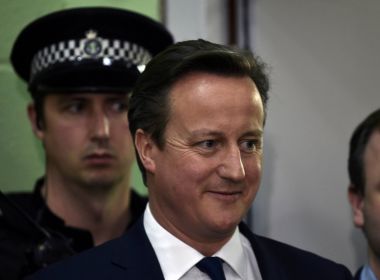Opposition parties crushed as Conservatives head for poll victory

Prime Minister David Cameron's Conservatives are set to govern Britain for another five years after an unexpectedly strong showing, but may have to grapple with renewed calls for Scottish independence after nationalists surged.
Ed Miliband, leader of the main opposition Labour Party, all but conceded defeat this morning, saying he was "deeply sorry" for a "very disappointing and difficult night".
Cameron said he hoped to form a government in the coming days after his party enjoyed what he described as a "very strong night".
With 630 results in, the Conservatives had won 315 of 650 seats and Labour 228. BBC forecasts predict a final result of Conservative 329, Labour 233, the Lib Dems eight and UKIP two. The SNP has won 56 seats in Scotland.
In practice, controlling 323 seats in parliament is enough to command a majority as four lawmakers from Northern Ireland's Sinn Fein refuse to take their places.
In Scotland, once a Labour stronghold, nationalists won almost every seat, a result likely to stoke momentum for Scottish independence by underscoring the political chasm that divides voters north of the border and the rest of the United Kingdom.
A Conservative victory means Britain is likely to face a historic in-out European Union referendum within two years, something Cameron has promised to deliver if re-elected.
Professor Vernon Bogdanor, a constitutional expert, said Cameron would be the first premier to gain seats since Margaret Thatcher in 1983.
Sterling gained more than two cents against the dollar to rise above $1.55 for the first time since late February, and looked on track to enjoy its biggest one-day gain against the euro since January 2009.
For Labour, the election represents a crushing defeat, and will be the party's worst result in almost three decades. The scale of its defeat in Scotland at the hands of nationalists is likely to raise serious questions about its future direction and policies.
If Cameron falls just short of an outright majority it looks like he will have multiple options to form a government anyway, perhaps with the support of the Liberal Democrats, his current coalition partners, or Northern Irish unionists or both.
He could also try and go it alone.
SCOTTISH "TSUNAMI"
With almost all of Scotland's 59 parliamentary seats counted, the Scottish National Party (SNP) had won 55 of them, all but obliterating Labour north of the border.
Opponents fear the SNP is preparing to use an emphatic win to renew its push for an independence referendum even though it lost such a plebiscite only last year.
"We're seeing an electoral tsunami on a gigantic scale," said Alex Salmond, the party's former leader.
"The SNP are going to be impossible to ignore and very difficult to stop," he said, saying such a result would strip Cameron of any legitimacy in Scotland where his Conservative Party would have only one lawmaker.
In a body blow to Labour, Douglas Alexander, the party's campaign chief and foreign policy spokesman, lost his seat to a 20-year-old Scottish nationalist student while Scottish Labour leader Jim Murphy was also toppled.
The centrist Liberal Democrats, who have governed in coalition with the Conservatives for the past five years, suffered stinging losses with the exit poll predicting they would finish with just 10 seats across the UK.
That would be a disaster for leader and deputy prime minister Nick Clegg, who called it a "cruel and punishing" night.
The UK Independence Party, which wants an immediate British withdrawal from the EU, was on track to get two seats at best amid speculation that Nigel Farage, its leader, would fail to be elected and therefore have to step down.
Before the election, opinion polls had shown the Conservatives and Labour neck-and-neck, leaving that industry facing a potential inquest.
Labour leader Miliband, who was widely perceived to have performed better in the campaign than expected, is likely to come under pressure to step down in the coming hours.
Indeed if the exit poll is right, three of Britain's political parties could soon be looking for a new leader.











